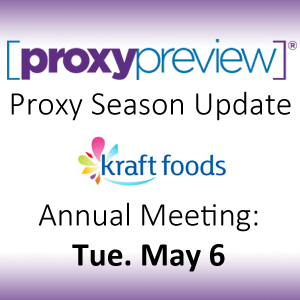
2014 Annual Meeting: 9:30 AM EDT, Tuesday, May 6, 2014
The Glen Club, 2901 West Lake Avenue, Glenview, Illinois 60026
Kraft has four pending ESG shareholder proposals in 2014.
- ENVIRONMENT: Non-Recyclable Packaging
- As You Sow has filed a resolution focusing on phasing out non-recyclable packaging, asking for a report “assessing the environmental impacts of continuing to use” non-recyclable packaging, noting new reports that link degraded plastic packaging to toxicity in ocean gyres, which broadens the focus area to threats to marine animals and human environmental health.
- ENVIRONMENT: Sustainable Forestry Report
- Domini Social Investments has been a long-time champion of more sustainable forestry, and this year it is trying to push the conversation into corporate supply chains, in the process raising a constellation of interrelated environmental and social justice issues. It is asking Kraft Foods Group to describe how it is “assessing the company’s supply chain impact on deforestation and associated human rights issues, and the company’s plans to mitigate these risks.”
The resolution seeks a closer corporate examination of problems connected to large-scale land acquisitions that are used to produce crops such as sugar cane, palm oil and soy, and says that many of these purchases “involve evicting traditional land holders, through coercion or fraud (‘land grabs’).” It quotes a finding from the Consumer Goods Forum, an industry network, that concluded companies are driving deforestation because of their demand for crops and food packaging materials. Domini reasons that deforestation, which negatively contributes to climate change, can be reduced if companies were to use more recycled materials, certification schemes, and supply chain monitoring. But it points out that Kraft has not responded to a survey about best forestry practices from CDP (formerly known as the Carbon Disclosure Project). It asserts that companies do not provide much information about their purchases of commodities, and suggests a list of key performance indicators that could help companies better manage risks associated with deforestation, which is integrally tied to global procurement networks.
Read advocacy pieces on land grabs and palm oil below.
- ENVIRONMENT: Animal Welfare
- Currently pending, this proposal from People for the Ethical Treatment of Animals (PETA) reprises a concern the organization first raised last year, and asks Kraft Foods to “to set a policy requiring the company’s dairy suppliers to work diligently and with all due haste to phase out the practice of dehorning by selecting for naturally polled, or hornless, cattle.” Resolutions on this subject in 2013 earned very little investor support, earning at most 2 percent.
- POLITICAL ACTIVITY: Lobbying
- This proposal from Green Century Equity Fund asks “that the board of directors adopt a policy to refrain from using corporate funds to influence any political election.” The key focus as expressed in the whereas clauses and supporting statement is spending by each company to defeat state ballot initiatives about labeling genetically modified food. The proponents chose to approach these companies because they were among the top contributors to such efforts.
State ballot initiatives have become flashpoints in the GMO labeling debate, with about two dozen separate efforts in 2013 alone. The most prominent effort to require labeling failed in late 2012 in California (Proposition 37), as the National Institute on Money in State Politics noted. The organization provides analysis of state political spending and found proponents’ spending of $10.5 million was dwarfed by the opposition’s $44.2 million – most of it from a group called the Coalition Against the Costly Food Labeling Proposition, funded by the Grocery Manufacturers Association and Monsanto, among others. More recently, Washington state voters rejected Initiative 522 in November 2013, in a battle that pitted many of the same national actors against each other again, prompting similarly lop-sided out-of-state spending by both sides that topped $22 million, a state record. The vote in California was 51.4 percent against and 13 companies spent more than $1 million each to fight it; in Washington, the vote was 51.1 percent against and at least five companies spent more than $1 million each to oppose the measure.
The proponents argue that such spending alienates customers “and can damage a corporation’s reputation and profits.” They conclude companies should not spend anything on elections, including:
independent expenditures, electioneering communications, and issue advocacy that can reasonably be interpreted as in support or opposition of a specific candidate or ballot measure. The policy should include measures, to the greatest extent practical, to prevent trade associations or non-profit corporations from channeling our company’s contributions or membership dues to influence the outcome of any election or referendum.
Download Proxy Preview 2014 to find more recyclable packaging, sustainable forestry, animal welfare, and lobbying resolutions.











